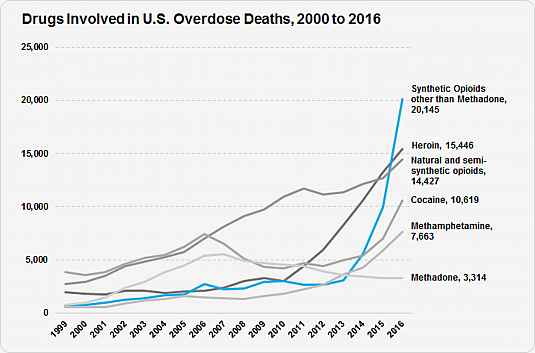
Statement from the NIH Director on Combating the Opioid Crisis with Scientific Solutions
Opioid misuse and addiction is an urgent and rapidly evolving public health crisis. An estimated 2 million Americans are addicted to opioids, and approximately 25 million suffer daily from chronic pain. The urgency and scale of this crisis calls for innovative scientific solutions, from prevention to intervention and treatment. Today, the President declared America’s opioid crisis a public health emergency. The National Institutes of Health is committed to bringing the full power of the biomedical research enterprise to bear on this crisis. That effort ranges from basic science of the complex neurological pathways involved in pain and addiction, to services and implementation science to develop and test treatment models, to integrating behavioral interventions with medication-assisted therapy, to forging strategic partnerships to advance safer, non-addictive treatments for pain.
In 2016, NIH spent $483 million on pain research ranging from cell and molecular mechanisms of acute and chronic pain, to safe, effective therapy development, to large scale clinical trials. Just this week, NIH issued the Federal Pain Research Strategy to prioritize funding in support of effective solutions to chronic pain. The belief that people with pain would not become addicted to opioid medications was promoted 20 years ago in the medical community, but sadly has contributed to an over-reliance on opioid medications, and to the current addiction and overdose crisis. While there are other approved medications and non-medication strategies that can be used to treat chronic pain, their effectiveness in many chronic pain conditions is limited and the medications come with their own side effects. There is a pressing need for potent alternative treatments for chronic pain that are non-addictive.
In support of the Administration’s efforts to provide concrete and rapid response to address America’s opioid crisis, NIH is pursuing formal partnerships with more than 30 biopharmaceutical companies and academic research centers to develop:
- safe, effective, non-addictive strategies to manage chronic pain
- new, innovative medications and technologies to treat opioid use disorders
- improved overdose prevention and reversal interventions to save lives and support recovery
We must, however, prevent addictions before they start. To help in this prevention effort, NIH began recruitment in September 2016 for its Adolescent Brain Cognitive Development (ABCD) study. This landmark, long-term study will follow the brain and behavioral development of more than 10,000 children beginning at ages 9-10, before they initiate drug use, through the period of highest risk for substance abuse and other mental health disorders as they transition into adulthood. Supported by eight NIH institutes and offices, and the Centers for Disease Control and Prevention, the study will track exposure to substances, academic achievement, cognitive skills, mental health, and brain structure and function using advanced research methods to inform prevention and treatment strategies.
NIH is committed to working with the White House, Health and Human Services and our sibling agencies, and the public and private sectors to take an “all hands on deck” approach, delivering the scientific tools that will help end this crisis and prevent it from re-emerging in the future.
Francis S. Collins, M.D., Ph.D.
Director, National Institutes of Health
Director, National Institutes of Health
































No hay comentarios:
Publicar un comentario